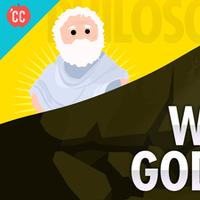12b. What is God Like? Part 2/2.
● FLASH Philosophy - Thought Bubble (06:09)
Let's look at this idea up close in this week's FLASH Philosophy. When people talk about praying for something to happen, or to not happen, or are otherwise making a request of god, they're making what are known as petitionary prayers. When you pray in this way, you're asking god for something - to help you pass a test, or to save a loved one who's in danger, or to make sure the Patriots win the game. Contemporary American philosopher Eleonore Stump argues that:
"We have no reason to think that asking god for something would actually make a difference." She thinks about it like this:
If god knows everything, including the future (which he does if, he's omniscient), and if god has the power to bring about any state of affairs (which he does. if he's omnipotent), and if he always wants to bring about the best state of affairs (which he does, if he's omnibenevolent), then god has already decided what's going to happen in every single case. To everyone.
Always.
So either your prayer is asking god to do something he was already going to do, in which case your case was kind of a waste of time, or your prayer is asking god to do something he's already decided not to do because it wasn't factually the best thing. Sorry Patriots. And in that case, even if god wanted to change his mind based on your prayer, you wouldn't want him to because it would actually make things worse then they would have been if you'd just let god do his thing. In other words:
"If god knows what's best, why would you want to change his mind?" Now, Stump suggests that:
"There might be some value in the asking. Even if the prayer doesn't actually change what's going to happen." Maybe you agree with her, but at this point, it should be clear just how many problems there are in the divine attributes when you think about them. Thanks Thought Bubble.
● Body: Analogical Predication (07:31)
Thomas Aquinas, the thinker who's largely responsible for the traditional divine attributes we think of today, responded to these sorts of puzzles by saying that all this speculation of what god is like is just analogical predication. Basically, Aquinas said that we can't predicate, or assert, anything about god, because he's so far beyond our understanding. When we speak of god, Aquinas said, we never really say anything that's true. Instead, we have to speak entirely in analogies, because that's all we can do. So god isn't literally our father, for example, but we can understand his role for us as being father-like because that's as close as we can get to really understanding what he is. Or think of it this way: people in South Florida might say it's cold when the temperature dips into the 50s, but in Alaska, it's not cold until it's well below 0. But both of those frames of reference are more similar to each other to each than they are to the cold that is absolute zero, which is about -273 degrees Celsius. You might even say that absolute zero cold and -10 degree cold are not even the same thing, but we use that one word, "cold," to describe them both as a kind of analogical way of talking about something that defies our complete and personal understanding. So Aquinas basically said not to worry about all of these puzzles because none of these things we say about god is more than an approximation - a little analogue that our tiny little minds can come up with so that we can talk about an infinite being.
● Conclusion: God May Love Amethyst (08:49)
Now there are other thinkers, particularly in modern times, who point out that none of the traditional divine attributes are in the bible anyway, so maybe god isn't an omni god. Maybe he's more like a superhero - he can be way smarter than us, way more powerful than us, way more good than us, but still not perfect. This seems like a sacrilege to a lot of people, but some philosophers argue that it's more compatible with the god of the bible. After all, in the bible, we see god doing very human things like walking in the garden, getting angry, being surprised, and changing his mind. So it could be possible that god actually does hate cilantro or is a big fan of Amethyst.
● Closing: What We Learned (09:22)
That's the kind of stuff that we, as philosophers, get to ponder - kindly, and thoughtfully, in the comments. Today, we learned about The Traditional Divine Attributes, Omnipotence, Omniscience, Omnitemporality, and Omnibenevolence, and the puzzles they create for our understanding of god.
We also explored some possible solutions to those puzzles from Aquinas' ideas of Analogical Predictions to the work of Eleonore Stump. This episode is brought to you by Squarespace. Squarespace helps to create websites, blogs, or online stores for you and your ideas. Websites look professionally designed regardless of skill level - no coding required.
Try Squarespace at Squarespace.com/crashcourse for a special offer. Squarespace: share your passion with the world.
Crash Course Philosophy is produced in association with PBS and Digital Studios. You can head over to their channel to check out amazing shows like Shanks FX, It's Okay To Be Smart, and The Art Assignment. This episode of Crash Course was filmed in the Doctor Cheryl C. Kinney Crash Course studio with the help of all of these awesome people and our equally fantastic graphics team is Thought Cafe.

